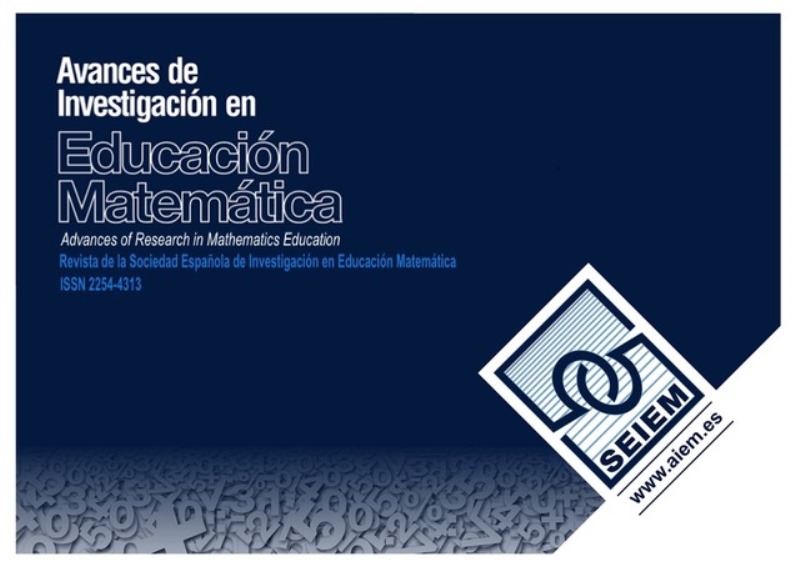Connecting statistics education and sustainability: beliefs of Primary Education teachers
DOI:
https://doi.org/10.35763/aiem23.5415Keywords:
Beliefs, Education for sustainable development, Primary education, Statistics education, Teacher trainingAbstract
Currently, teachers are being challenged to integrate sustainability into school classrooms in various disciplines, and the statistics education is not immune to this trend. Against this backdrop, in this work we investigate the belief system of 11 Chilean primary education teachers who are active in statistics education and its links with sustainability. To this end, we conducted semi-structured interviews and analyzed them using a qualitative methodology under an interpretive approach. The results show that teachers acknowledge the integration of statistics education and sustainability as a challenge, identifying as the most recurring topics their mastery of content and the development of skills.
Downloads
References
Aiken, L. R. (1985). Three coefficients for analyzing the reliability and validity of ratings. Educational and Psychological Measurement, 45, 131-142. https://doi.org/10.1177/0013164485451012
Alsina, Á. (2022). On Integrating Mathematics Education and Sustainability in Teacher Training: Why, to What End and How? In: Ortega-Sánchez, D. (Ed.), Controversial Issues and Social Problems for an Integrated Disciplinary Teaching (Integrated Science, vol 8). Springer. https://doi.org/10.1007/978-3-031-08697-7_2
Alsina, Á., & Mulà, I. (2019). Advancing towards a transformational professional competence model through reflective learning and sustainability: The case of mathematics teacher education. Sustainability, 11(15), 4039; https://doi.org/10.3390/su11154039
Cobb, G., & Moore, D. (1997). Mathematics, statistics, and teaching. American Mathematical Monthly, 104(9), 801-823. https://doi.org/10.1080/00029890.1997.11990723
Cohen, L., Manion, L., & Morrison, L. (2018). Research methods in education (8 Ed.). Routledge. https://doi.org/10.4324/9781315456539
Dahl, T. (2019). Prepared to Teach for Sustainable Development? Student Teachers’ Beliefs in Their Ability to Teach for Sustainable Development. Sustainability, 11(7), 1993-2103. https://doi.org/10.3390/su11071993
Foucault, M. (2019). ¿Qué es la crítica? Seguido de La cultura de sí: Sorbona, 1978 / Berkeley, 1983 (E. Castro, Ed.; H. Pons, Trad.). Siglo Veintiuno Editores.
Gómez-Chacón, I.M., Op’t Eynde, P., & De Corte, E. (2006). Creencias de los estudiantes de matemáticas. La influencia del contexto de clase. Enseñanza de las ciencias, 24(3), 309-324. https://doi.org/10.5565/rev/ensciencias.3784
Guterres, A. (2020). Conectar el mundo con datos en los que podemos confiar. Día Mundial de la estadística. https://www.un.org/es/observances/statistics-day
Kvale, S. (1994). Ten standard objections to qualitative research interviews-Special issue: Qualitative research. Journal of Phenomenological Psychology, 25(2),147-173. https://doi.org/10.1163/156916294X00016
Laurie, R., Nonoyama-Tarumi, Y., McKeown, R., & Hopkins, C. (2016). Contributions of education for sustainable development (ESD) to quality education: A synthesis of research. Journal of Education for Sustainable Development, 10(2), 226-242. https://doi.org/10.1177/0973408216661442
Li, H., & Tsai, T. (2022) Education for sustainable development in mathematics education: what could it look like? International Journal of Mathematical Education in Science and Technology, 53(9), 2532-2542. https://doi.org/10.1080/0020739X.2021.1941361
Miles, M. B., Huberman, A. M., & Saldaña, J. (2014). Qualitative data analysis: A method sourcebook (3. ed.). Sage.
Stake, R. (2020). Investigación con estudio de casos. Morata, S.L.
Tilbury, D. (2011). Education for sustainable development: an expert review of processes and learning. UNESCO.
Uitto, A., & Saloranta, S. (2017). Subject Teachers as Educators for Sustainability: A Survey Study. Education Sciences, 7(1), 8-26. https://doi.org/10.3390/educsci7010008
UNESCO (2014). Aichi-Nagoya Declaration on Higher Education for Sustainable Development. Author. https://doi.org/10.15381/anales.v45i3-4.6061
UNESCO (2017). Educación para los objetivos de desarrollo sostenible: objetivos de aprendizaje. Author.
Vásquez, C. (2020). Educación estocástica: una herramienta para formar ciudadanos de sostenibilidad. Revista Matemática, Educación y Sociedad, 3(2), 1-20.
Vásquez, C., & Alsina, Á. (2021). Conectando Educación Estadística y Educación para la Sostenibilidad: un marco para promover el desarrollo sostenible en la formación del profesorado. En Sola, T., Alonso, S., Fernández, M. G. & De La Cruz, J. C. (Eds.), Estudios sobre Innovación e Investigación Educativa (pp. 973-985). Dykinson.
Vásquez, C. & Alsina, Á. (2022). Retos contemporáneos en la formación del profesorado: desarrollando competencias de sostenibilidad desde la educación estadística. Revista Científica Ecociencia, 9(4), 111-132.
Vásquez, C., García-Alonso, I., Seckel, M.J., & Alsina, Á. (2021). Education for Sustainable Development in Primary Education Textbooks—An Educational Approach from Statistical and Probabilistic Literacy. Sustainability, 13(6), 3115. https://doi.org/10.3390/su13063115
Vásquez, C., Piñeiro, J. L., & García-Alonso, I. (2022). What challenges does the 21st century impose on the knowledge of primary school teachers who teach mathematics? An analysis from a Latin American perspective. Mathematics, 10(3), 391. https://doi.org/10.3390/math10030391
Vásquez, C., Seckel, M.J., & Alsina, Á. (2020). Belief system of future teachers on Education for Sustainable Development in math classes. Uniciencia, 34(2), 1-15. https://doi.org/10.15359/ru.34-2.1
Downloads
Published
How to Cite
Issue
Section
License
Copyright (c) 2023 Claudia Vásquez (Autor); María José Seckel, Francisco Rojas

This work is licensed under a Creative Commons Attribution 4.0 International License.
The articles published in this journal are under a license Creative Commons: By 4.0 España from number 21 (2022).
Authors who publish with this journal agree to the following terms:
- Authors retain copyright and keep the acknowledgement of authorship.
- The texts published in this journal are – unless indicated otherwise – covered by the Creative Commons Attribution 4.0 international licence. You may copy, distribute, transmit and adapt the work, provided you attribute it (authorship, journal name, publisher) in the manner specified by the author(s) or licensor(s). The full text of the licence can be consulted here: http://creativecommons.org/licenses/by-nc/4.0.
- Authors are able to enter into separate, additional contractual arrangements for the non-exclusive distribution of the journal's published version of the work (e.g., post it to an institutional repository or publish it in a book), with an acknowledgement of its initial publication in this journal.
- Authors are permitted and encouraged to post their work online (e.g., in institutional repositories or on their website) prior to and during the submission process, as it can lead to productive exchanges, as well as earlier and greater citation of published work (See The Effect of Open Access).
Funding data
-
Agencia Nacional de Investigación y Desarrollo
Grant numbers 1200356









